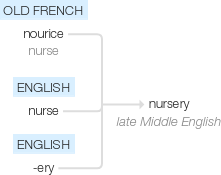Nursery
late Middle English: from Old French nourice ‘nurse’ (see nurse1) + -ery.
wiktionary
From Middle English noricerie, norserye(“children's nursery; state of being fostered or nursed; education, upbringing”)[and other forms], [1] from Old French norricerie, nourricerie, from norrice, nourrice (modern French nourrice(“childminder, nanny; wet nurse”)) + -erie(suffix forming feminine nouns). Norrice and nourrice are derived from Late Latin nūtrīcia(“wet nurse”), from Latin nūtrīcius(“that nurses or suckles; nourishing”), from nūtriō(“to breastfeed, nurse, suckle”), possibly ultimately from Proto-Indo-European *(s)neh₂-(“to flow”). The English word may be analysed as nourice, nurse + -ery(suffix forming nouns meaning ‘place of’). [2]
etymonline
nursery (n.)
c. 1300, noricerie, "place or room for infants and young children and their nurse," from Old French norture, norreture "food, nourishment; education, training," from Late Latin nutritia "a nursing, suckling," from Latin nutrire "to nourish, suckle" (see nourish). From c. 1500 as "place where anything is fostered." As a type of school for very young children, 1580s. The horticultural sense of "place where trees are raised to be transplanted" is from 1560s. Nursery rhyme is by 1807.
